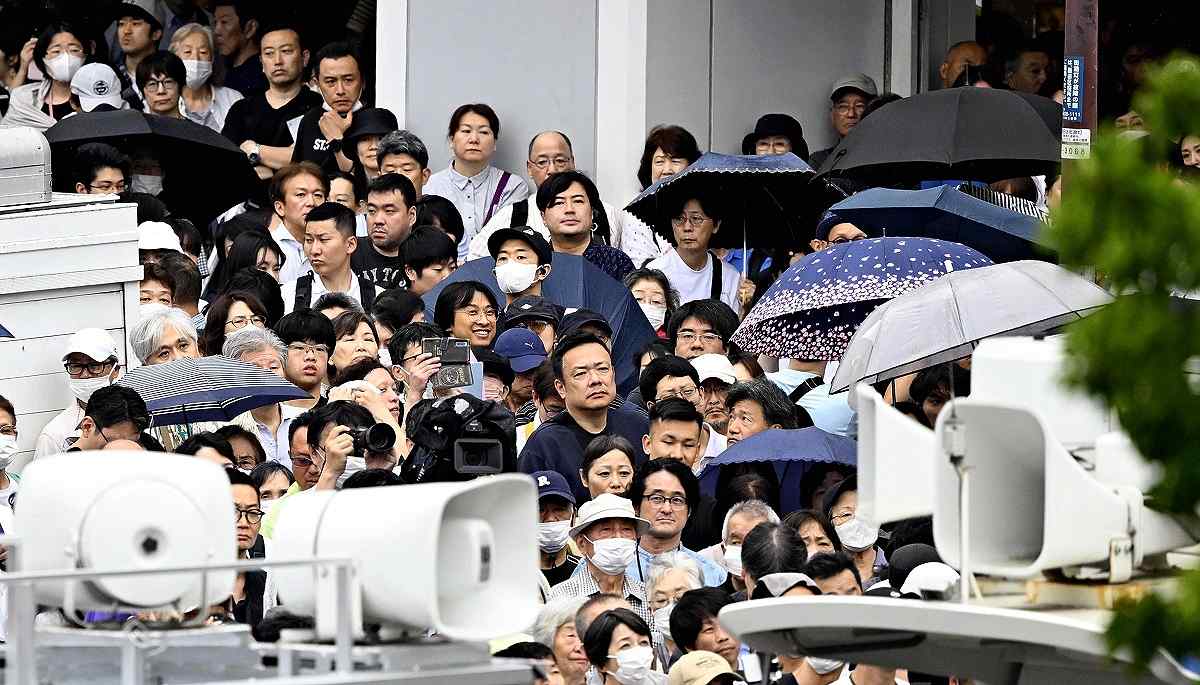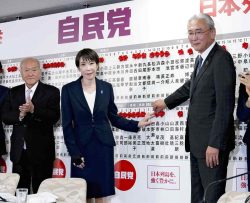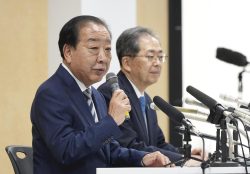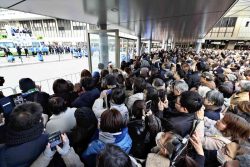Japan’s LDP Relieved over Koike’s Lead in Tokyo Election; Renho Struggles to Attract Voters with No Party Preference

People listen to a candidate in the Tokyo gubernatorial election in Sumida Ward on June 23.
15:42 JST, July 2, 2024
A sense of relief has spread among the Liberal Democratic Party since a Yomiuri Shimbun poll showed that incumbent Tokyo Gov. Yuriko Koike, the independent candidate it supports at its own initiative, is leading the gubernatorial race.
The poll also found that Renho, an independent running with the full support of the main opposition Constitutional Democratic Party of Japan, is struggling to attract voters with no party preference. The CDPJ is gravely concerned.
Both the LDP and its coalition partner Komeito are urging their supporting organizations and others behind the scenes to support Koike in Sunday’s election. However, they are refraining from any overt activities in consideration of the headwinds caused by issues of “politics and money.”
“The focus [in the campaigning] has been Koike’s administration of the capital, rather than confrontation between the ruling and opposition parties,” an LDP Tokyo chapter official said. “[Support for Koike] has spread among voters with no party preferences.”
The LDP is also closely monitoring the impact on the by-elections for the metropolitan assembly, which will be held the same day as the gubernatorial election. The LDP fielded candidates in eight of the nine electoral districts in which by-elections will be held, and is aiming to win in four or more districts.
There are hopes within the party that Koike’s lead in the gubernatorial election will have a positive effect on the by-elections, but the different parties are far more prominent in the campaigning for the by-elections.
“It’s different from the gubernatorial election, and it is not such an easy battle,” a senior LDP official said.
The CDPJ, the Japanese Communist Party and other organizations are having their senior officials join Renho’s street rallies, in a bid to help her gain momentum.
“The problems with Koike’s administration have spread to the people of Tokyo. The last three days [of the campaign period] will be crucial,” CDPJ Policy Research Committee Chairperson Akira Nagatsuma, who also serves as head of the party’s Tokyo chapter, told The Yomiuri Shimbun on Monday.
However, the Yomiuri poll found that only slightly more than 10% of respondents with no party preference backed Renho, putting her behind Shinji Ishimaru, a former mayor of Akitakata, Hiroshima Prefecture.
The Renho side has emphasized a “battle between the ruling and opposition parties,” but about 40% of respondents who did not support the Cabinet of Prime Minister Fumio Kishida backed Koike. This indicates that Renho has failed to capture the votes of people critical of the Kishida administration.
There are limits to the CDPJ’s cooperation with the JCP in campaigning for Renho. “Having a united front with the JCP has caused voters with no party preference to stop supporting us,” a mid-career CDPJ member said.
The outcome of the gubernatorial election may affect future cooperation between the two parties.
Top Articles in Politics
-

Japan PM Takaichi’s Cabinet Resigns en Masse
-

Sanae Takaichi Elected Prime Minister of Japan; Keeps All Cabinet Appointees from Previous Term
-

Japan’s Govt to Submit Road Map for Growth Strategy in March, PM Takaichi to Announce in Upcoming Policy Speech
-

LDP Wins Historic Landslide Victory
-

LDP Wins Landslide Victory, Secures Single-party Majority; Ruling Coalition with JIP Poised to Secure Over 300 seats (UPDATE 1)
JN ACCESS RANKING
-

Japan PM Takaichi’s Cabinet Resigns en Masse
-

Japan Institute to Use Domestic Commercial Optical Lattice Clock to Set Japan Standard Time
-

Israeli Ambassador to Japan Speaks about Japan’s Role in the Reconstruction of Gaza
-

Man Infected with Measles Reportedly Dined at Restaurant in Tokyo Station
-

Videos Plagiarized, Reposted with False Subtitles Claiming ‘Ryukyu Belongs to China’; Anti-China False Information Also Posted in Japan























